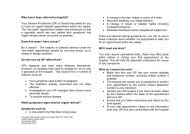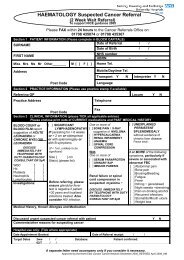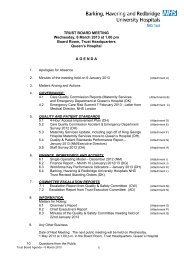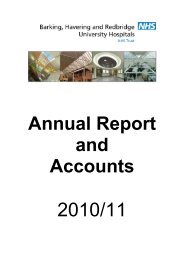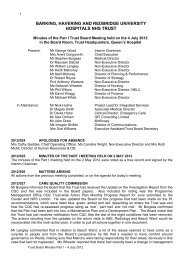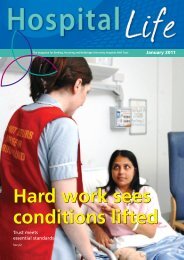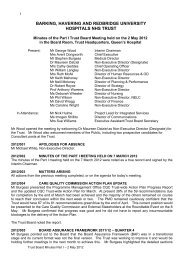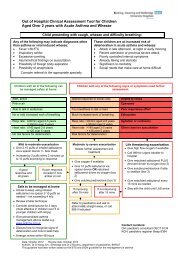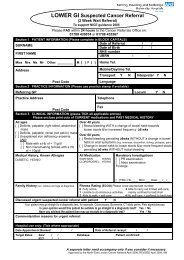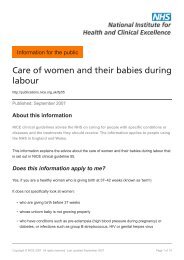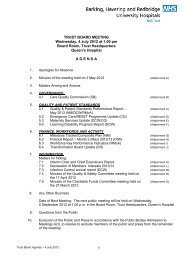Trust Board papers November 2012 - Barking Havering and ...
Trust Board papers November 2012 - Barking Havering and ...
Trust Board papers November 2012 - Barking Havering and ...
You also want an ePaper? Increase the reach of your titles
YUMPU automatically turns print PDFs into web optimized ePapers that Google loves.
Grade 2<br />
Caesarean section is considered urgent with maternal or foetal compromise which is not<br />
immediately life threatening. To be performed within 60 minutes<br />
At BHRUT hospitals, of 63% the audited grade 2 emergency C/S were performed within 60<br />
minutes.<br />
An audit of the grading of emergency caesarean sections is being carried out to ensure that<br />
emergency caesarean sections are not being misclassified.<br />
Grade 3 & 4<br />
Caesarean section is an emergency with no maternal or foetal compromise, but requires<br />
early delivery. To be performed at a time to suit the mother <strong>and</strong> the department.<br />
At BHRUT, 100% of the audited grade 3/4 emergency C/S were performed within time.<br />
There were no adverse outcomes associated with delayed LSCS.<br />
It should also be noted that the target of 100% achievement is not based on national guidance.<br />
Royal College of Obstetricians <strong>and</strong> Gynaecologists Good Practice No. 11 2 of 4noted that:<br />
To formalise the concept that urgency of caesarean section represents a continuum of risk:<br />
● four broad categories of risk are defined<br />
● all staff should be aware that, within each category, the degree of risk in individual cases can<br />
vary<br />
● a coloured spectrum is used to emphasise that continuum of risk<br />
● this variance in degree of risk requires an individual, case-by-case approach in deciding the<br />
specific<br />
decision-to-delivery interval (DDI).<br />
The ‘Sentinel’ caesarean section audit suggested that in cases such as cord prolapse, a DDI of 15<br />
minutes was feasible. However, in many category-1 cases, delivery within 30 minutes was not<br />
achieved. Delivery within 75 minutes does not appear to increase the risk of compromise, while<br />
delivery within 30 minutes may not<br />
always result in a good neonatal outcome. Once a decision to deliver has been made, therefore,<br />
delivery should be carried out with an urgency appropriate to the risk to the baby <strong>and</strong> the safety<br />
of the mother. Units should strive to design guidelines that result in the shortest safely achievable<br />
DDI. Evidence suggests that any delay is usually associated with the delay in transfer to theatre.<br />
A target DDI for caesarean section for ‘fetal compromise’ of 30 minutes is an audit tool that<br />
allows testing of the efficiency of the whole delivery team <strong>and</strong> has become accepted practice;<br />
however:<br />
• certain clinical situations will require a much quicker DDI than 30 minutes <strong>and</strong> units should<br />
work towards improving their efficiency<br />
• undue haste to achieve a short DDI can introduce its own risk, both surgical <strong>and</strong><br />
anaesthetic, with the potential for maternal <strong>and</strong> neonatal harm.<br />
Mat 2 October <strong>2012</strong> (2).doc<br />
Page 8 of 9<br />
Compiled by C Frisby 12.07.<strong>2012</strong><br />
8



![[4] Biopsy Leaflet.pub - Barking, Havering and Redbridge University ...](https://img.yumpu.com/51285530/1/190x134/4-biopsy-leafletpub-barking-havering-and-redbridge-university-.jpg?quality=85)
